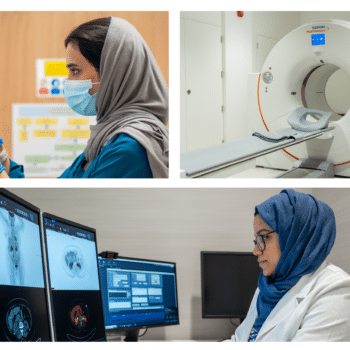GU program organizes awareness event
The SQCCCRC, represented in the GU Programme, organized an awareness-raising event entitled “Screening and reassurance”, with the aim of raising awareness of the importance of early cancer detection in increasing the effectiveness of treatment and reducing late-stage detection.
Dr. Hilal Bin Ali Al-Rashdi, Consultant Urologist at the Center, explained: “Urology is a group of cancers that affect people of all ages, especially men. The most common types include prostate cancer, bladder cancer, testicular cancer, and kidney cancer. Over the past decades, significant progress has been made in the diagnosis and treatment techniques of urological cancers, which has had a positive impact on patients’ recovery rates and quality of life.
Dr. Al-Rashdi added: “The event included the distribution of awareness leaflets to identify signs and symptoms of urological cancers and the therapeutic methods used and prevention methods to reduce the risk of urinary tract cancers healthy lifestyle and regular physical exercise and a diverse diet of vegetables and fruits, refraining from smoking and alcoholic beverages and to perform regular medical examinations, especially for those groups most at risk of contracting the disease such as the elderly and those with a family history of infection.
According to WHO statistics, 206 cases of testicular cancer are recorded daily among men, 753 cases of kidney cancer, 1224 cases of bladder cancer and 3,928 cases of prostate cancer.
Dr. Mohammed Marzouq Abdullah, Senior Consultant Urologist, stated that prostate cancer is one of the most common types of cancer among men around the world, and is more likely to develop it with age, out of every 8 men 1 of whom can develop the disease in their lifetime. Prostate cancer symptoms often appear in the late stages of cancer. Problems in urination and the appearance of blood in urine or semen bone pain, weight loss, while many patients cannot observe symptoms and signs of injury in early stages of illness, Testing PSA specific antigen levels in the blood is therefore the most prevalent way to detect early signs of prostate cancer.
Dr. Mohammed, added the results of blood and tissue tests is complex and requires a team of specialists to come up with the most accurate diagnosis and treatment plan for the patient, Therefore, it is recommended that all new cases be discussed by a multidisciplinary team of urologists and radiation oncologists, oncologists, pathologists and radiologists and the design of an individual patient’s personal care plan to ensure the best possible treatment outcome.
Dr. Munjid Al-Harthy, a consultant urologist, stated that options for the treatment of urological cancers depend on several factors, such as the stage of the disease, its prevalence, the patient’s general condition, as well as the potential benefits or side effects of the treatment. For example, immediate treatment may not be necessary for cases of low-grade prostate cancer, and treatment may not be needed at all in some cases. Instead, doctors sometimes recommend careful monitoring and monitoring of the condition, where blood, rectum and prostate biopsies are performed to monitor the worsening of the cancer condition. If tests show that cancer is worsening, the medical team may decide to start the prostate cancer treatment program with either surgery, radiation, medication or any other methods used to treat prostate cancer in the Sultanate of Oman and around the world.





